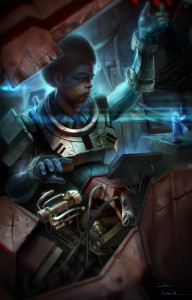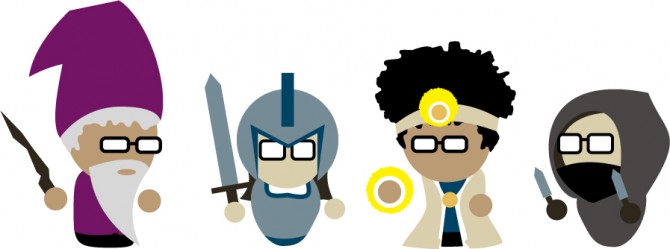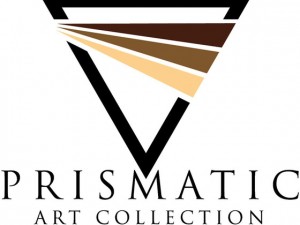
Recently, I read one of the most wonderful anecdotes I’d ever heard. Nichelle Nichols, who played Lt. Uhura on Star Trek, gave the keynote speech at Goddard’s 2012 Martin Luther King, Jr., and African-American History Month commemorative presentation. After Star Trek’s first season, she was set to leave. The stage was her first love and she wanted to pursue that instead of the television show. After confessing her feelings to Gene Roddenberry, he asked her to take the weekend to reconsider. That weekend she attended a NAACP fundraiser. During the event, she was asked if she would talk to a fan.
“I stood up and turned around, and looked into the beautiful face of Dr. Martin Luther King—my leader!” Nichols said. They discussed the cultural significance of Nichols’s role and her intent to depart television for the stage. She reflected on King’s response: “You cannot leave; you cannot abdicate,” he told her. “You don’t know what you mean to us. Every night that you’re on, we can look on and see what we’re fighting for.”
Her choice to remain created long-lasting ripples. Mae Jemison, a former NASA astronaut, cited Uhura as an inspiration for becoming an astronaut. Nichols’ work as a NASA recruiter also impacted the decisions of Sally Ride, Guion Bluford, Judith Resnik, and Ronald McNair. Whoopi Goldberg also points to Uhura as a turning point in her life, recalling that she ran through the house saying “I just saw a black woman on television; and she ain’t no maid!”
Without characters such as Uhura, we run into what Chimamanda Adichie calls “The Danger of One Story.” In her TED talk, the novelist discusses her childhood in Nigeria and recalls a number of instances where she or another found that their view of others was mistaken because they had only heard one story, one view of the others’ life. She starts with her experience reading foreign books as a young girl, how she came away with the belief that books had to have foreign characters and things she didn’t recognize from her own life. Until she discovered African literature, she did not realize that people like her could be characters in books.
These stories not only point to the importance of diverse characters, they describe why we often lack these characters now. As mentioned in “Concerning Historical Authenticity in Fantasy, or Truth Forgives You Nothing,” when people bring up the issue, they often are met with arguments about historical authenticity, a mistaken view of history that often is based on having heard only a single story more than any real attempt to confine ourselves to accuracy. It comes from a place of discomfort or fear, a misunderstanding of the reasons we create and consume fantasy literature. These fears sometimes stop us from creating something new, something different. The changes are not only unfamiliar; they force us to question our beliefs and outlooks, to imagine something new, to question the things that we love, why we love them, and what our enjoyment of problematic themes says about us.

The resulting fear and sometimes embarrassment can lead us to avoid the issue altogether and cover the avoidance with arguments such as historical authenticity. Thus, even content creators who are knowledgeable about the importance of a diversity, will avoid adding diversity to their work. A new generation grows up with just one story, all knights are white men on horseback seeking to save a princess and make her his own. Having not been introduced to other stories, they continue the cycle. They might not think of making anyone other than a European into a medieval knight and, even if they did, they might think that no one would want such a thing, that there’s no market for it.

Breaking this cycle is difficult. Without belief there’s a market, it’s hard for companies to move in that direction, especially with the number of people who argue against it. Without movement towards diversity, it’s harder to convince non-traditional groups that they are welcome. My project, Prismatic Art Collection, is an attempt to disrupt the cycle, to both show that there is a demand for this type of artwork and to give content creators, especially smaller ones, the tools to help them create content for non-traditional groups.
We’re using Kickstarter to raise money to commission inclusive artwork from a diverse group of artists. I partnered with Daniel Solis, an art director and well-known game designer who designed games such as Do: Pilgrims of the Flying Temple and Happy Birthday, Robot! The artwork will be released through the Creative Commons 3.0 Attribution Share-Alike license and may be used in commercial products. We’ve put together a list of artists including Ursula Vernon (a Hugo Nominee), Julie Dillon, Jennifer Rodgers, Claire Hummel, Amy Houser, Robert Scott, Jody Lindke, Shari Chankhamma, and Meng Tian Zhang. We’re designing a website where people can find all of the art created as well as a directory of artists who want to create art that celebrates the diversity of the world, both real and imagined.
We just passed our initial funding goal of $5,000 which will get us at least 20 pieces of art commissioned for this project. The exact number of pieces will depend on the feedback we get from the backers and the mix of artists. We’re not offering many tangible rewards to backers since the printing and fulfillment costs can quickly eat into the budget for art. However, we did have a few artists offer to do character portraits for patrons and those pieces also will be added to the collection, increasing the number of pieces. We also negotiated with the Farewell to Fear crew, a progressive post-fantasy RPG, to have all of the artwork created for that project added to our collection.
Is this project a panacea to the problem of lack of diversity and inclusivity in fantasy art and roleplaying games? No. The issues are so great and nuanced that no one solution exists. However, my hope is that together we can take a step forward, open up the discussion, get past our fear, and start to see the future before us.


And it looks like the kickstarter met its first goal!
[…] A guy who gives a long monologue on Game of Thrones might just be nervous. Since you’ve been kind of writing those guys off anyway, might as well try, “That show looked fun, but it turns out to have kind of a lot of rape in it, which I found … distracting.” (Not to foist my impression of Game of Thrones on you, but that was totally my impression of Game of Thrones.) See where that goes. Either you can truly write the guy off for saying something idiotic, or maybe you’ll end up in a fascinating discussion about why fantasy, as an industry, could use more diverse voices. […]